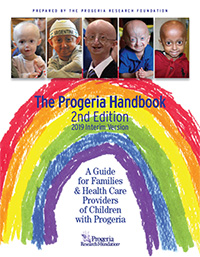Patient Care
& Handbook
 Progeria Handbook Purpose
Progeria Handbook Purpose
Because most medical caretakers have never treated a child with Progeria, there are often questions about how to optimize quality of life through daily care and medical treatment. To answer that need, in April 2010, PRF published the first edition of The Progeria Handbook, for families touched by Progeria and their doctors. From basic health facts to daily care recommendations to extensive treatment guidelines, this 131-page handbook helps answer many questions for children with Progeria throughout the world.
2019 Updates
In March 2019, PRF updated and edited every section of the first edition of the handbook. Some of the biggest changes to the second edition include a new section on genetics and genetic counseling for the health professional, and a plethora of new information from recent clinical studies stemming from the Progeria research community, including new cardiovascular, neurovascular and endocrine information as well as recommendations.
When using these materials for reports or presentations, please include the following:
Source: The Progeria Handbook; A Guide for Families and Health Care Providers of Children with Progeria.
Copyright 2019 by The Progeria Research Foundation. All rights reserved.
We will continue to update these materials as more information comes in. If you have specific medical questions, please contact us at (978) 535-2594 or info@progeriaresearch.org.
Thank you to every child and family who participates in these very important projects, and to the medical caretakers and other experts contributing to these recommendations.
Thank You to Our Volunteer Translators
A special thanks to Dr. Muneaki Matsuo for organizing the translation of the 2nd Edition – Japanese Handbook; to Dr. Tadashi Satoh and medical staff of Pediatrics in Saga University for their help with the translation; and to Professor Kenji Ihara, Oita University, and Dr. Rika Kozaki, National Center for Child Health and Development, for proofreading.
Our sincere thanks and appreciation to Dr. Daniel Tanure and Dr. Laura Cheib for the time and energy they devoted to the Portuguese translation of The Progeria Handbook – 2nd Edition.
We are grateful to Sammy Basso and the Associazione Italiana Progeria Sammy Basso for organizing and funding the Italian translation of The Progeria Handbook – 2nd Edition, and to Elise Treggia for the time and effort she devoted to the translation.
Again we extend our thanks to Sammy Basso and the Associazione Italiana Progeria Sammy Basso for organizing and funding the Arabic translation of The Progeria Handbook – 2nd Edition, to Elise Treggia for coordinating with her network of translators, and to Sara Anani for her beautiful work on the translation.

Because most medical caretakers have never treated a child with Progeria, there are often questions about how to optimize quality of life through daily care and medical treatment. To answer that need, in April 2010, PRF published the first edition of The Progeria Handbook, for families touched by Progeria and their doctors. From basic health facts to daily care recommendations to extensive treatment guidelines, this 131-page handbook helps answer many questions for children with Progeria throughout the world.
In March 2019, PRF updated and edited every section of the first edition of the handbook. Some of the biggest changes to the second edition include a new section on genetics and genetic counseling for the health professional, and a plethora of new information from recent clinical studies stemming from the Progeria research community, including new cardiovascular, neurovascular and endocrine information as well as recommendations.
When using these materials for reports or presentations, please include the following:
Source: The Progeria Handbook; A Guide for Families and Health Care Providers of Children with Progeria.
Copyright 2019 by The Progeria Research Foundation. All rights reserved.
We will continue to update these materials as more information comes in. If you have specific medical questions, please contact us at (978) 535-2594 or info@progeriaresearch.org.
Thank you to every child and family who participates in these very important projects, and to the medical caretakers and other experts contributing to these recommendations.

